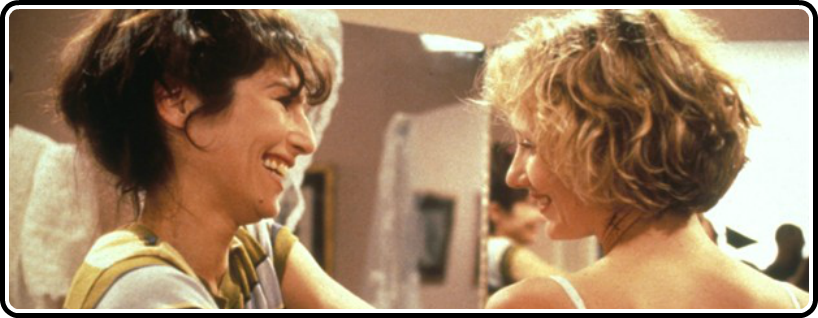Nearly coming to its 20th anniversary, the major debut of director Nicole Holofcener, Walking And Talking is not only one of the most well-respected independent releases of a decade that saw the rise of modern-day American independent cinema, but also announced that a new voice in the film world was here, and here to stay. Now as her next film slowly finds a cast, we take a look back at what may very well be one of the best American independent film of the most influential decade in modern American independent film.
Starring the likes of Catherine Keener, Anne Heche, Todd Field and Live Schreiber, the film follows the story of two women, who not only deal with their own romantic relationships, but also the relationship that they each share with one another. Set in New York City, the film is the definition of what most filmgoers think of when they imagine an independent American film, featuring a hip soundtrack, intimate and low-key filmmaking and pithy interchanges between verbose hipsters, but it’s so very much more.
Playing like an early, albeit slightly ‘better’ made, mumblecore feature, Walking And Talking is entirely an actor set piece. Heche and Keener are career defining here, giving some of the best performances of what have become two huge careers amongst this independent world. Encompassed entirely in one sequence involving the pair laying out their thoughts about each other, only to break down and simply tell each other that they do truly love one another, it shows how deft a hand Holofcener has tonally with her features, Walking And Talking also being her feature film writing debut.
Holofcener got her first taste of feature film work as an extra on various work, the first of which being Woody Allen’s unsung A Midsummer’s Night Sex Comedy, something that seems like a serendipitous bit of luck, as the pair share more than just a onetime meeting. Entirely focused on a handful of men and women and their relationships with each other intellectually and more importantly, romantically, Walking and Talking feels, tonally, as if it were a modern descendent of Allen’s dramatic work, something of a cousin of sorts to a film like Interiors or Hannah And Her Sisters, the latter being the closest kin. It’s not an intensely over crafted feature; David Fincher Holofcener is not, but it’s intimate, beautifully shot, and emotionally impactful unlike most films of its era and since.
And with this focus on romance and its constant problems, the supporting cast has to be an absolute knock out. Thankfully, that’s what we have her. Todd Field stars as Heche’s romantic main squeeze, and their story is easily the most interesting. With the highest peaks and the lowest valleys the film has to offer, their story arch is both the most interesting, and it’s absolutely heart-wrenching. Be it their fights, or a sequence of such heartfelt playfulness inside of an elevator, the pair’s chemistry is top-notch, and the film thrives when these two are on-screen. Keener’s love flows between Schreiber and Kevin Corrigan, both of whom are fantastic, with Corrigan again proving that he’s one of today’s best character actors. Schreiber is equally great, in a role that frankly, we don’t see him in enough. It’s a great turn by a great actor who proves he has far more range than we give him credit for.
Featuring a soundtrack including the likes of Liz Phair and Criterion-friendly Yo La Tengo (they do after all have a cut of Jean Painleve films that they scored, found on Criterion’s DVD of Painleve’s films. Sidenote: THAT is a Blu-grade just waiting to happen), this film screams for a Blu-ray release. No Blu-ray is available stateside (at least via a lengthy Amazon search yours truly did), and with a direct influence on films like Criterion-approved Tiny Furniture, this film is anxiously awaiting the Criterion release it so richly deserves. And who wouldn’t love to hear that Yo La Tengo-assisted soundtrack in a new audio transfer?




![Bergman Island (The Criterion Collection) [Blu-ray]](https://criterioncast.com/wp-content/uploads/2022/11/bergman-island-the-criterion-collection-blu-ray-400x496.jpg)
![This Is Not a Burial, It’s a Resurrection (The Criterion Collection) [Blu-ray]](https://criterioncast.com/wp-content/uploads/2022/11/this-is-not-a-burial-its-a-resurrection-the-criterion-collection-blu-ray-400x496.jpg)
![Lars von Trier's Europe Trilogy (The Criterion Collection) [The Element of Crime/Epidemic/Europa] [Blu-ray]](https://criterioncast.com/wp-content/uploads/2022/11/lars-von-triers-europe-trilogy-the-criterion-collection-the-element-of-400x496.jpg)
![Imitation of Life (The Criterion Collection) [Blu-ray]](https://criterioncast.com/wp-content/uploads/2022/11/imitation-of-life-the-criterion-collection-blu-ray-400x496.jpg)
![The Adventures of Baron Munchausen (The Criterion Collection) [4K UHD]](https://criterioncast.com/wp-content/uploads/2022/11/the-adventures-of-baron-munchausen-the-criterion-collection-4k-uhd-400x496.jpg)
![Cooley High [Criterion Collection] [Blu-ray] [1975]](https://criterioncast.com/wp-content/uploads/2022/11/cooley-high-criterion-collection-blu-ray-1975-400x496.jpg)